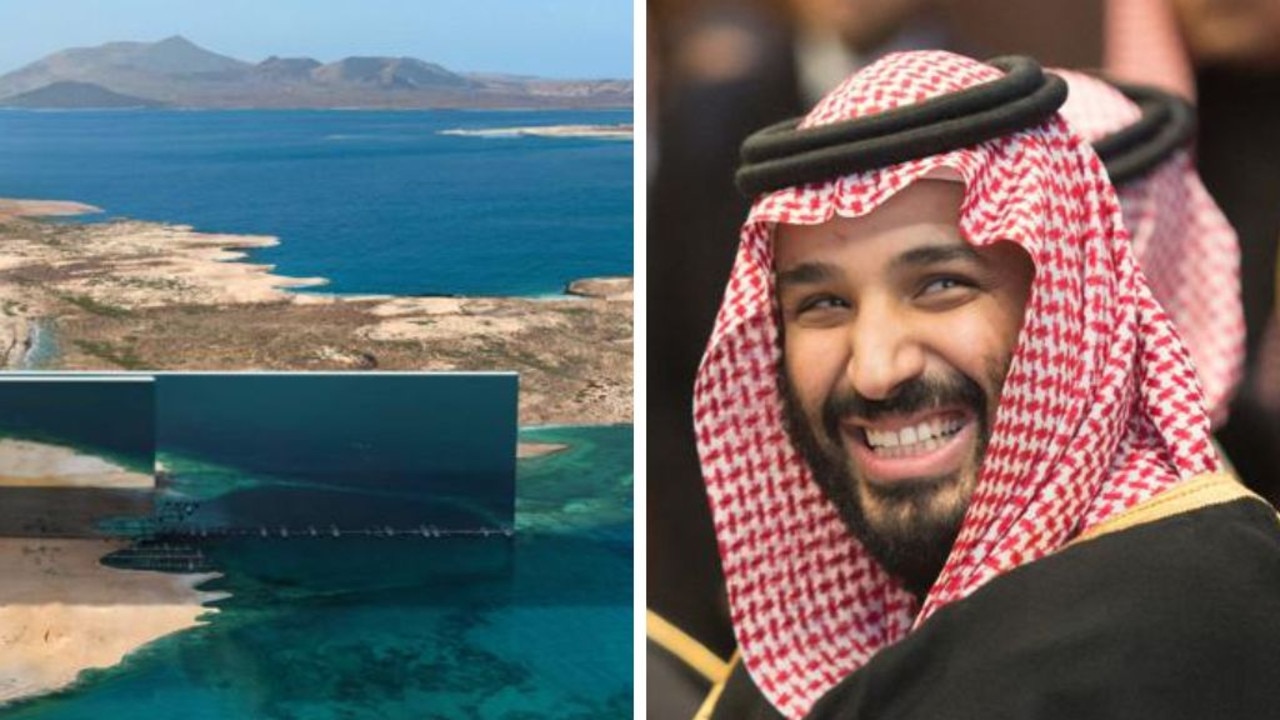[ad_1] A controversial playboy prince has had three tribesmen sentenced to death for daring to oppose his dystopian dreams of building a futuristic
[ad_1]
A controversial playboy prince has had three tribesmen sentenced to death for daring to oppose his dystopian dreams of building a futuristic megacity across the Saudi Arabian desert.
The men faced ejection from their tribal lands. Now their death sentence for speaking out against the brainchild of 37-year-old Crown Prince Mohammed bin Salman Al Saud has been upheld.
He has been spruiking flashy videos of the 500m tall, 200m wide, 170km long crystal palace he wants to cut through his nation’s broad desert — regardless of any obstacle in its path.
The $750 billion NEOM smart city project – dubbed “The Line” – will be 33 times bigger than New York. It’s being promoted internationally as a “zero-carbon”, hi-tech (and high surveillance) home for nine million people.
But traditional occupants, landowners and existing residents have been compelled to make way as the high-profile project drives ahead.
And when six men from the Howeitat tribe refused to move out of their homes, they were detained, tortured and charged with terrorism offences.
Now the United Nations Human Rights Office is raising the alarm.
“Despite being charged with terrorism, they were reportedly arrested for resisting forced evictions in the name of the NEOM project,” the UN advisors warn.
“Under international law, States that have not yet abolished the death penalty may only impose it for the ‘most serious crimes’ involving intentional killing. We do not believe the actions in question meet this threshold.”
Holding the line
Crown Prince Mohammed first rose to international prominence when he overturned laws forbidding women from driving cars. But the brutal murder of Washington Post journalist Jamal Khashoggi in Istanbul in 2018 left an evidence trail leading directly to him and his closest advisors.
And he has begun cultivating close relationships with Russia’s President Vladimir Putin and China’s Chairman Xi Jinping.
The Crown Prince is Chairman of the NEOM megaproject’s board of directors, and he personally released the design of The Line in July last year.
“We committed to a civilisational revolution that puts humans first based on a radical change in urban planning,” he said.
“The city’s vertically layered communities will challenge the traditional flat, horizontal cities and create a model for nature preservation and enhanced human liveability.
“The line will tackle the challenges facing humanity in urban life today and will shine a light on alternative ways to live.”
It’s all part of a marketing strategy for the megastructure that emphasises sustainability, luxury, and innovation under new “progressive laws”.
But the bold project has attracted widespread criticism.
The structure will encompass 26,500 square kilometres — despite having a physical footprint of 34sq km. This includes a new international airport, high-speed trains and other supporting infrastructure.
Fears have been raised about the impact of such an enormous glittering wall on local wildlife, sand flows and water supplies. And promised compensation for forced evictions has been either controversial or non-existent.
Human rights bodies report at least 150 people have been arrested for defying the Prince’s wishes.
“The Saudi kingdom severely punishes citizens who dare to express public criticism of the government,” says the Business & Human Rights Resource Centre.
In 2022, Saudi authorities executed 122 people, with 81 of these taking place on a single day in March. Their offences ranged from adultery to blasphemy.
Do or die
Compulsory eviction notices began to be issued in January 2020 in the northwest Saudi Arabian Tabuk Province villages of Al Khuraiba, Gayal and Sharma. Work clearing land for the megacity began in October of that year.
Independent human rights monitoring group ALQST says one of the convicted men is the brother of Abdul Rahim al-Howeiti, who was reportedly shot dead after complaining about his plight on social media.
Howeiti had become a high-profile opponent of the Crown Prince’s project, posting videos, photos and accounts detailing the eviction process.
The Saudi Government says Howeiti had to be “neutralised” after barricading himself inside his house. But complaints to the Human Rights Office contradict this account, claiming he was the victim of an “extrajudicial execution”.
“In March 2020, members of the Saudi Special Forces, sometimes in groups of more than 40 vehicles at a time, began to raid the homes of those residents of the Al Khuraiba village that were opposing the eviction.
Mr Al Huwaiti had been vocal and active in raising concerns on the evictions and had engaged in publicly documenting the actions of the authorities in this context,” the report reads.
Mr Shadly Ahmad Mahmoud Abou Taqiqa al-Huwaiti, Mr Ibrahim Salih Ahmad Abou Khalil al-Huwaiti and Mr Atallah Moussa Mohammed al-Huwaiti now face the death penalty. Another three face up to 50 years in jail.
The charges were laid in 2020. They were convicted last August, and their appeals were rejected in late January.
“All six individuals have been charged under the overly vague 2017 Saudi law on combating crimes of terrorism and its financing,” the human rights body says.
“We urge all companies involved, including foreign investors, to ensure that they are not causing or contributing to, and are not directly linked to serious human rights abuses.”
[ad_2]
Source link



COMMENTS